 Petzlover
Petzlover Deutsch Drahthaar is originated from Germany but Gaddi Kutta is originated from India. Both Deutsch Drahthaar and Gaddi Kutta are having almost same height. Deutsch Drahthaar may weigh 12 kg / 26 pounds lesser than Gaddi Kutta. Both Deutsch Drahthaar and Gaddi Kutta has almost same life span. Deutsch Drahthaar may have less litter size than Gaddi Kutta. Deutsch Drahthaar requires Moderate Maintenance. But Gaddi Kutta requires High Maintenance
Deutsch Drahthaar is originated from Germany but Gaddi Kutta is originated from India. Both Deutsch Drahthaar and Gaddi Kutta are having almost same height. Deutsch Drahthaar may weigh 12 kg / 26 pounds lesser than Gaddi Kutta. Both Deutsch Drahthaar and Gaddi Kutta has almost same life span. Deutsch Drahthaar may have less litter size than Gaddi Kutta. Deutsch Drahthaar requires Moderate Maintenance. But Gaddi Kutta requires High Maintenance
 Hailing from Germany in the 20th century, the Deutsch Drahthaar, also known as the German wirehaired Pointer, has always been a hunting dog. He was developed to take part in hunting in field or water.
Hailing from Germany in the 20th century, the Deutsch Drahthaar, also known as the German wirehaired Pointer, has always been a hunting dog. He was developed to take part in hunting in field or water.
Breeders of this dog were successful in developing a skilled and versatile hunting dog that took its traits from the best coarse haired dogs.
It was in 1902 that the German breed club for the Deutsch-Drahthaar was founded.
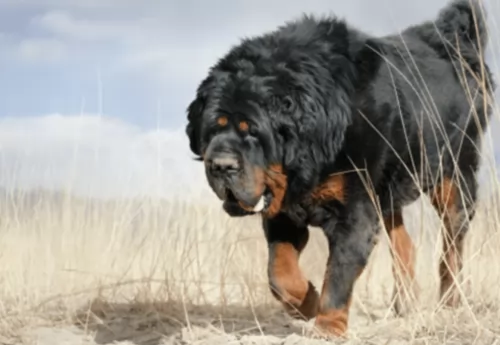 The Gaddi Kutta is mountain dog of the mastiff line from northern India. They are mostly found in the western Himalayas and Himachal Pradesh. It is also seen in Nepal and often named the Indian Panther Hound and the Mahidant Mastiff. They were bred to hunt but because of their strength and intelligence they are used to guard and herd goats and sheep. They are strong enough to defeat or scare off a panther or snow leopard and intelligent enough to work independently in finding strays and bringing them back to their pens. They have been known to protect herds of cattle from bears and leopards.3 or 4 of them working together can handle the guard duties for thousands of cattle.
The Gaddi Kutta is mountain dog of the mastiff line from northern India. They are mostly found in the western Himalayas and Himachal Pradesh. It is also seen in Nepal and often named the Indian Panther Hound and the Mahidant Mastiff. They were bred to hunt but because of their strength and intelligence they are used to guard and herd goats and sheep. They are strong enough to defeat or scare off a panther or snow leopard and intelligent enough to work independently in finding strays and bringing them back to their pens. They have been known to protect herds of cattle from bears and leopards.3 or 4 of them working together can handle the guard duties for thousands of cattle.
Their reputation precedes them – as ferocious and courageous, unmatched in their instincts to protect what is theirs. In the line of the Mastiffs and Molosser, the Gaddi is powerful and agile, and considered to be of ancient heritage though no one is sure what their origin is. The local myth is that dogs were crossed with tigers. It is more likely that dingo-like wild hounds from the Himalaya were crossed with the Tibetan Mastiff to create the Gaddi Kutti. Also found in Pakistan, most lines of the breed have been crossed with others including the German Shepard and the Bully Kutta. Outside of the Himalayas there are not many if any pure lines. The Gaddi Kutta is a good family dog if you socialize him as a puppy. He will be gentle, calm and intuitive with his family, but aggressive toward strangers and other dogs.
 The Deutsch-Drahthaar is a medium sized well muscled sporting dog standing at 61 to 68 cm and weighing 27-32kg.
The Deutsch-Drahthaar is a medium sized well muscled sporting dog standing at 61 to 68 cm and weighing 27-32kg.
He is very distinguishable with his wiry water-resistant coat which comes in different colors such as liver, grey or black patches with a speckled or ticked background.
He has strong, straight legs with rounded paws which are webbed for strong swimming abilities. He has dark eyes with floppy, high set ears and a long tail. Many people still want the dog to have that distinctive look and they opt to have the tail docked.
The Deutsch-Drahthaar is a fantastic hunting companion, loving nothing more than to be working at running across fields and plunging into water to retrieve prey.
Its the kind of dog that will fit well into family life but he will require exercise. Failing to give him exercise and attention will make him bored, frustrated and destructive.
He is a friendly, gentle dog yet he becomes protective when he feels his family is threatened. Training and socialization turn him into an excellent pet as he is a strong-willed dog that will take advantage of an owner who isn’t firm with him.
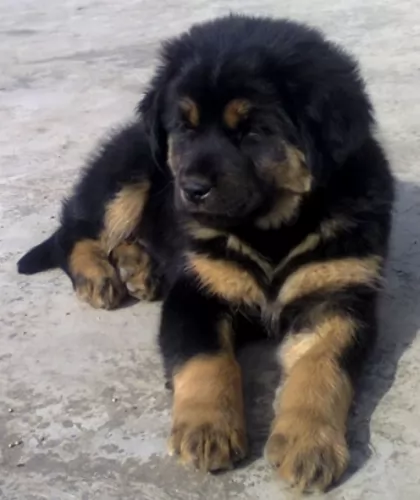 The Gaddi Kutta is a mastiff but he is athletic, has tremendous speed and stamina. He is muscular and deep-chested, leaner than most of the mastiff lines. Their ears can be either natural or cropped, on a very large head. One of the most important traits of the Gaddi Kutta is the massive, arched neck that protects them from predators. He is sturdy with a heavily feathered, thick tail curling over the back.
The Gaddi Kutta is a mastiff but he is athletic, has tremendous speed and stamina. He is muscular and deep-chested, leaner than most of the mastiff lines. Their ears can be either natural or cropped, on a very large head. One of the most important traits of the Gaddi Kutta is the massive, arched neck that protects them from predators. He is sturdy with a heavily feathered, thick tail curling over the back.
They are massive, wolf like dogs, fiery and huge but intelligent and faithful to their people. They are scary even when they are trying to be affectionate. The muzzle is strong, and the mane is thick. The Gaddi has long, heavy legs and very large feet that are feathered, making him even more intimidating.
There are two types of Gaddi Kutti – the longhaired and the shorthaired. The longhaired is the most common and has a fuller coat with long feathering on the tail, legs and chest and some feathering on the feet. They are all usually solid colors of yellow, fawn and cream or they could be piebald, brown or brindle. They have a woolly dense undercoat.
 The German Wirehaired Pointer is an active, energetic dog who is happiest when performing a task or getting some exercise in. He is also a social dog, who loves spending time with his human family. It is important for him to get noticed by his human family, and he is a dog that gets on well with children in the home as well as pets.
The German Wirehaired Pointer is an active, energetic dog who is happiest when performing a task or getting some exercise in. He is also a social dog, who loves spending time with his human family. It is important for him to get noticed by his human family, and he is a dog that gets on well with children in the home as well as pets.
Never just put your Pointer in the back yard and expect him to entertain himself. He wants to be included in all your activities, whether you’re walking, jogging or cycling.
A happy Deutsch Drahthaar will make sure that he gives you your full quota of love, loyalty, protection and companionship.
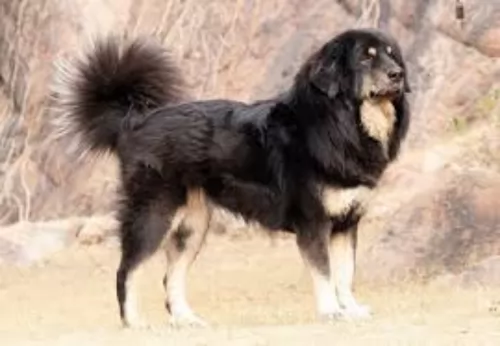 They are not always great with children, but they will protect own children in their family. Do not leave unattended.
They are not always great with children, but they will protect own children in their family. Do not leave unattended.
They have the ability to bring down a wolf or even a bear or snow leopard.
Because of his size, temperament and coat he is not very adaptable. He is good outside in a colder region and with a lot of land to roam, but not in a hot region or in an apartment.
This breed is very smart, learns quickly on his own.
 When you start doing research on these German wirehairs, you see that they are far more prone to hip- and elbow dysplasia than the short-haired breed.
When you start doing research on these German wirehairs, you see that they are far more prone to hip- and elbow dysplasia than the short-haired breed.
Also, von Willebrand’s blood-clotting disease is something that you should know about. Your German wirehair is a healthy, robust dog and is highly unlikely to get sick, but you need to be aware of these common dog ailments so that you can help him and know what to watch for.
This Von Willebrand’s disease for instance is a blood disease brought about by a deficiency of von Willebrand Factor (vWF). A lack of this vWF impairs platelet stickiness and clumping and can lead to excessive bleeding after an injury.
You may notice bleeding from the gums, bruising of skin, prolonged bleeding after an injury as well as blood in the urine for instance. Get your pet to the vet who will perform a physical exam on your dog.
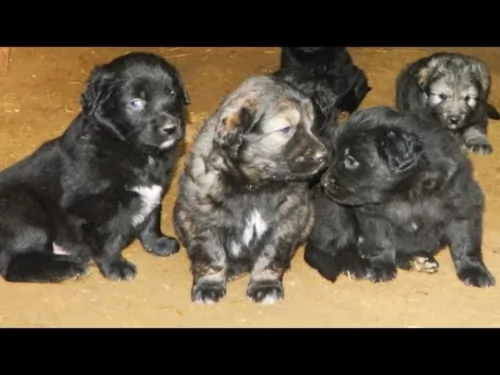 The breed is prone to obesity if they do not get enough exercise or a decent diet.
The breed is prone to obesity if they do not get enough exercise or a decent diet.
 Your Deutsch Drahthaar does shed, and because of his wiry coat, he won’t only require a brush twice a week, but also stripping by a professional doggy parlor.
Your Deutsch Drahthaar does shed, and because of his wiry coat, he won’t only require a brush twice a week, but also stripping by a professional doggy parlor.
There are several other grooming processes that are essential for your dog. The first is to check that his nails don’t get too long. This often happens when he spends all his time on soft grass. Running on a hard surface trims them down naturally.
Also, because he has floppy ears, they will need to be checked and cleaned regularly so he doesn’t get an ear infection. His teeth will also need to be brushed twice a week as tartar and plaque build-up can cause problems with the teeth but also with other areas of the body.
If in doubt about how to groom your pet the right way, speak to your vet or a dog expert.
There is so much conflicting information on caring for dogs, even from so-called dog experts. While there are some excellent dog food manufacturers around, some experts will say that you should be feeding your dog based on what his digestive system was designed to eat and steer clear of these.
If you do feed your German wirehaired Pointer with manufactured dog food, make sure it is the very best one, because after all, nutrition plays a vital role in your pet’s health.
Try to include some cooked vegetables, brown rice and some chicken into his diet. These can be mixed into his kibble. It is expensive, but try to include some raw meat into your dog’s diet from time to time. Ensure a constant supply of cool, fresh water.
If your Deutsch Drahthaar isn’t going to be used for breeding, make sure that your have him or her neutered or spayed as this is advisable to promote good health. Not doing it can cause health issues later on.
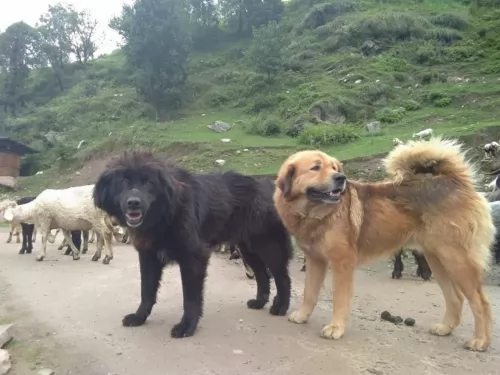 Should feed a high quality dry puppy food for large dogs. Give 1-2 cups per day split into 2-3 meals.
Should feed a high quality dry puppy food for large dogs. Give 1-2 cups per day split into 2-3 meals.
Again you want to feed high quality dry adult dog food for large dogs. Give 3-4 cups per day split into 2 meals. Watch for obesity and if your Gaddi Kutta is gaining too much weight, cut back.
The Gaddi Kutti seems to be immune to the most common of canine diseases.
This is a breed of very large dogs that need daily exercise by walking and running. However, since they have been fairly isolated in India and the Himalayas, he has not been exposed to organized dog play and exercise such as agility, dock jumping or field trials. He would probably succeed at all three.